Analyzing Mind-Body Therapies and Their Use in Medical Conditions
VerifiedAdded on 2023/06/12
|8
|2181
|264
Essay
AI Summary
This essay explores the application of mind-body therapies as complementary treatments for various medical conditions, emphasizing their role in enhancing emotional, mental, and physical well-being. It discusses the impact of these therapies on cancer patients, individuals with HIV, and those suffering from mood disorders. The essay highlights specific techniques such as meditation, Qigong, Taiji, and mindfulness-based stress reduction, explaining how they help manage stress, improve quality of life, and promote emotional stability. By integrating these practices with conventional medical approaches, patients can experience reduced pain, improved coping mechanisms, and a more holistic approach to their overall health and wellness. The essay concludes that mind-body techniques offer valuable support in addressing the emotional and psychological aspects of medical conditions, complementing the medical interventions provided by physicians.
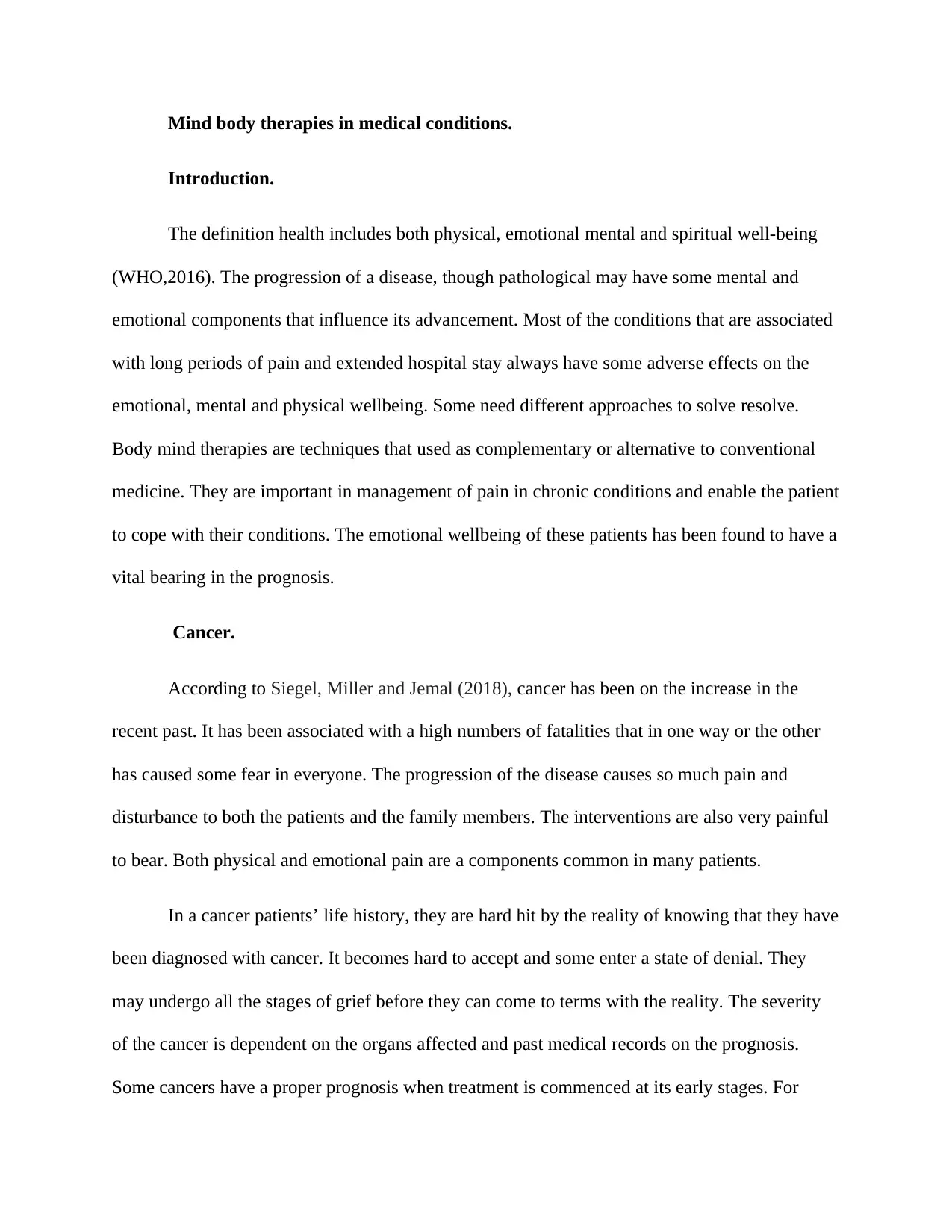
Mind body therapies in medical conditions.
Introduction.
The definition health includes both physical, emotional mental and spiritual well-being
(WHO,2016). The progression of a disease, though pathological may have some mental and
emotional components that influence its advancement. Most of the conditions that are associated
with long periods of pain and extended hospital stay always have some adverse effects on the
emotional, mental and physical wellbeing. Some need different approaches to solve resolve.
Body mind therapies are techniques that used as complementary or alternative to conventional
medicine. They are important in management of pain in chronic conditions and enable the patient
to cope with their conditions. The emotional wellbeing of these patients has been found to have a
vital bearing in the prognosis.
Cancer.
According to Siegel, Miller and Jemal (2018), cancer has been on the increase in the
recent past. It has been associated with a high numbers of fatalities that in one way or the other
has caused some fear in everyone. The progression of the disease causes so much pain and
disturbance to both the patients and the family members. The interventions are also very painful
to bear. Both physical and emotional pain are a components common in many patients.
In a cancer patients’ life history, they are hard hit by the reality of knowing that they have
been diagnosed with cancer. It becomes hard to accept and some enter a state of denial. They
may undergo all the stages of grief before they can come to terms with the reality. The severity
of the cancer is dependent on the organs affected and past medical records on the prognosis.
Some cancers have a proper prognosis when treatment is commenced at its early stages. For
Introduction.
The definition health includes both physical, emotional mental and spiritual well-being
(WHO,2016). The progression of a disease, though pathological may have some mental and
emotional components that influence its advancement. Most of the conditions that are associated
with long periods of pain and extended hospital stay always have some adverse effects on the
emotional, mental and physical wellbeing. Some need different approaches to solve resolve.
Body mind therapies are techniques that used as complementary or alternative to conventional
medicine. They are important in management of pain in chronic conditions and enable the patient
to cope with their conditions. The emotional wellbeing of these patients has been found to have a
vital bearing in the prognosis.
Cancer.
According to Siegel, Miller and Jemal (2018), cancer has been on the increase in the
recent past. It has been associated with a high numbers of fatalities that in one way or the other
has caused some fear in everyone. The progression of the disease causes so much pain and
disturbance to both the patients and the family members. The interventions are also very painful
to bear. Both physical and emotional pain are a components common in many patients.
In a cancer patients’ life history, they are hard hit by the reality of knowing that they have
been diagnosed with cancer. It becomes hard to accept and some enter a state of denial. They
may undergo all the stages of grief before they can come to terms with the reality. The severity
of the cancer is dependent on the organs affected and past medical records on the prognosis.
Some cancers have a proper prognosis when treatment is commenced at its early stages. For
Paraphrase This Document
Need a fresh take? Get an instant paraphrase of this document with our AI Paraphraser
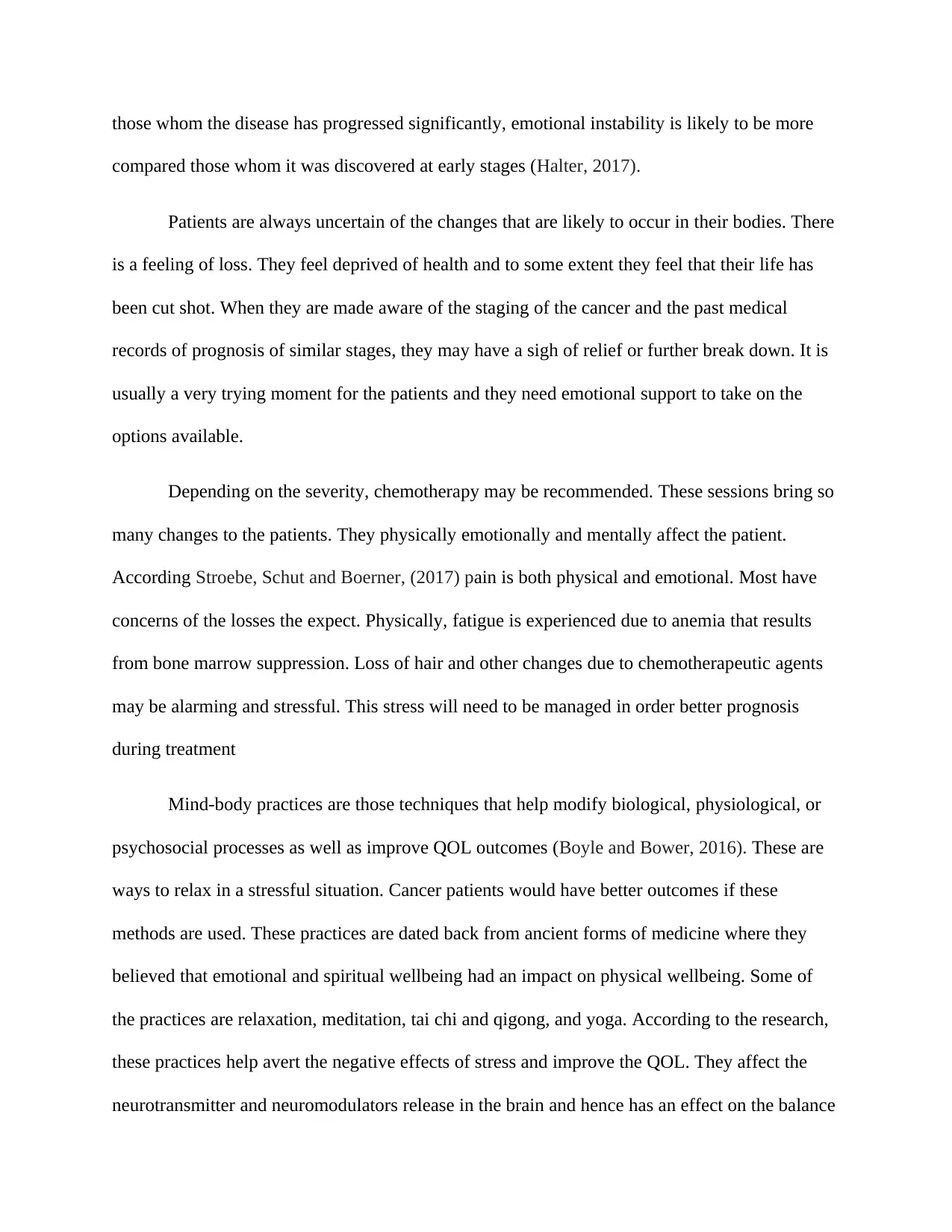
those whom the disease has progressed significantly, emotional instability is likely to be more
compared those whom it was discovered at early stages (Halter, 2017).
Patients are always uncertain of the changes that are likely to occur in their bodies. There
is a feeling of loss. They feel deprived of health and to some extent they feel that their life has
been cut shot. When they are made aware of the staging of the cancer and the past medical
records of prognosis of similar stages, they may have a sigh of relief or further break down. It is
usually a very trying moment for the patients and they need emotional support to take on the
options available.
Depending on the severity, chemotherapy may be recommended. These sessions bring so
many changes to the patients. They physically emotionally and mentally affect the patient.
According Stroebe, Schut and Boerner, (2017) pain is both physical and emotional. Most have
concerns of the losses the expect. Physically, fatigue is experienced due to anemia that results
from bone marrow suppression. Loss of hair and other changes due to chemotherapeutic agents
may be alarming and stressful. This stress will need to be managed in order better prognosis
during treatment
Mind-body practices are those techniques that help modify biological, physiological, or
psychosocial processes as well as improve QOL outcomes (Boyle and Bower, 2016). These are
ways to relax in a stressful situation. Cancer patients would have better outcomes if these
methods are used. These practices are dated back from ancient forms of medicine where they
believed that emotional and spiritual wellbeing had an impact on physical wellbeing. Some of
the practices are relaxation, meditation, tai chi and qigong, and yoga. According to the research,
these practices help avert the negative effects of stress and improve the QOL. They affect the
neurotransmitter and neuromodulators release in the brain and hence has an effect on the balance
compared those whom it was discovered at early stages (Halter, 2017).
Patients are always uncertain of the changes that are likely to occur in their bodies. There
is a feeling of loss. They feel deprived of health and to some extent they feel that their life has
been cut shot. When they are made aware of the staging of the cancer and the past medical
records of prognosis of similar stages, they may have a sigh of relief or further break down. It is
usually a very trying moment for the patients and they need emotional support to take on the
options available.
Depending on the severity, chemotherapy may be recommended. These sessions bring so
many changes to the patients. They physically emotionally and mentally affect the patient.
According Stroebe, Schut and Boerner, (2017) pain is both physical and emotional. Most have
concerns of the losses the expect. Physically, fatigue is experienced due to anemia that results
from bone marrow suppression. Loss of hair and other changes due to chemotherapeutic agents
may be alarming and stressful. This stress will need to be managed in order better prognosis
during treatment
Mind-body practices are those techniques that help modify biological, physiological, or
psychosocial processes as well as improve QOL outcomes (Boyle and Bower, 2016). These are
ways to relax in a stressful situation. Cancer patients would have better outcomes if these
methods are used. These practices are dated back from ancient forms of medicine where they
believed that emotional and spiritual wellbeing had an impact on physical wellbeing. Some of
the practices are relaxation, meditation, tai chi and qigong, and yoga. According to the research,
these practices help avert the negative effects of stress and improve the QOL. They affect the
neurotransmitter and neuromodulators release in the brain and hence has an effect on the balance
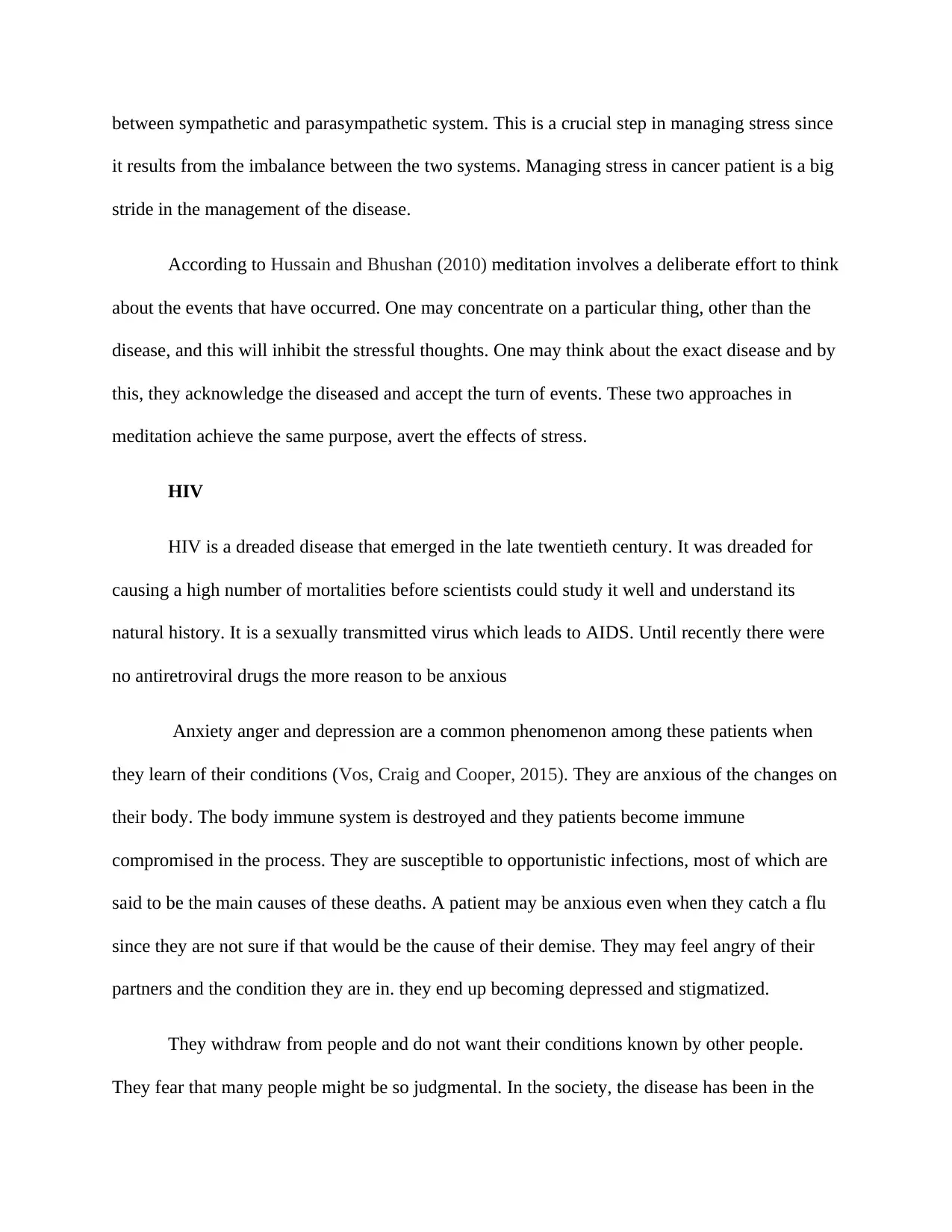
between sympathetic and parasympathetic system. This is a crucial step in managing stress since
it results from the imbalance between the two systems. Managing stress in cancer patient is a big
stride in the management of the disease.
According to Hussain and Bhushan (2010) meditation involves a deliberate effort to think
about the events that have occurred. One may concentrate on a particular thing, other than the
disease, and this will inhibit the stressful thoughts. One may think about the exact disease and by
this, they acknowledge the diseased and accept the turn of events. These two approaches in
meditation achieve the same purpose, avert the effects of stress.
HIV
HIV is a dreaded disease that emerged in the late twentieth century. It was dreaded for
causing a high number of mortalities before scientists could study it well and understand its
natural history. It is a sexually transmitted virus which leads to AIDS. Until recently there were
no antiretroviral drugs the more reason to be anxious
Anxiety anger and depression are a common phenomenon among these patients when
they learn of their conditions (Vos, Craig and Cooper, 2015). They are anxious of the changes on
their body. The body immune system is destroyed and they patients become immune
compromised in the process. They are susceptible to opportunistic infections, most of which are
said to be the main causes of these deaths. A patient may be anxious even when they catch a flu
since they are not sure if that would be the cause of their demise. They may feel angry of their
partners and the condition they are in. they end up becoming depressed and stigmatized.
They withdraw from people and do not want their conditions known by other people.
They fear that many people might be so judgmental. In the society, the disease has been in the
it results from the imbalance between the two systems. Managing stress in cancer patient is a big
stride in the management of the disease.
According to Hussain and Bhushan (2010) meditation involves a deliberate effort to think
about the events that have occurred. One may concentrate on a particular thing, other than the
disease, and this will inhibit the stressful thoughts. One may think about the exact disease and by
this, they acknowledge the diseased and accept the turn of events. These two approaches in
meditation achieve the same purpose, avert the effects of stress.
HIV
HIV is a dreaded disease that emerged in the late twentieth century. It was dreaded for
causing a high number of mortalities before scientists could study it well and understand its
natural history. It is a sexually transmitted virus which leads to AIDS. Until recently there were
no antiretroviral drugs the more reason to be anxious
Anxiety anger and depression are a common phenomenon among these patients when
they learn of their conditions (Vos, Craig and Cooper, 2015). They are anxious of the changes on
their body. The body immune system is destroyed and they patients become immune
compromised in the process. They are susceptible to opportunistic infections, most of which are
said to be the main causes of these deaths. A patient may be anxious even when they catch a flu
since they are not sure if that would be the cause of their demise. They may feel angry of their
partners and the condition they are in. they end up becoming depressed and stigmatized.
They withdraw from people and do not want their conditions known by other people.
They fear that many people might be so judgmental. In the society, the disease has been in the
⊘ This is a preview!⊘
Do you want full access?
Subscribe today to unlock all pages.

Trusted by 1+ million students worldwide
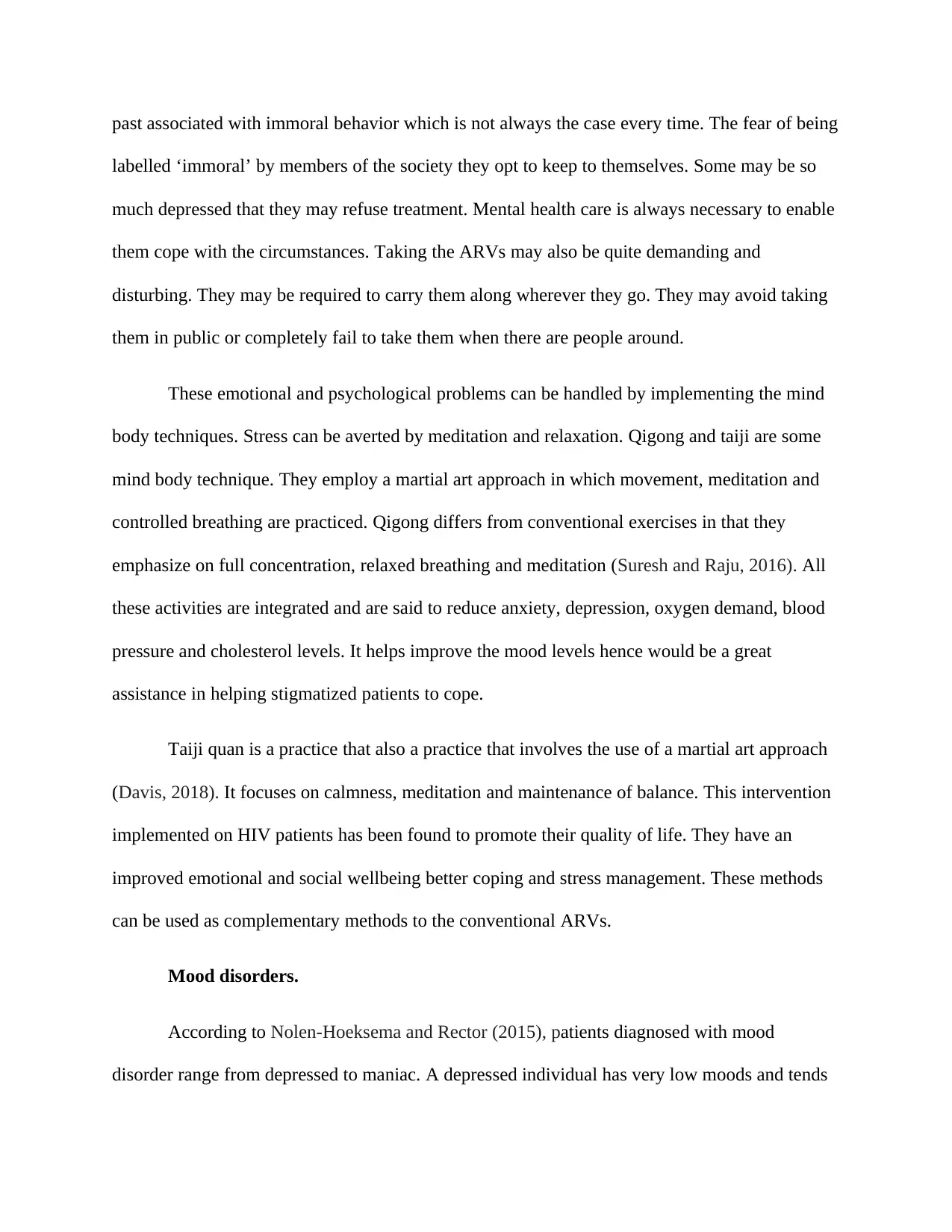
past associated with immoral behavior which is not always the case every time. The fear of being
labelled ‘immoral’ by members of the society they opt to keep to themselves. Some may be so
much depressed that they may refuse treatment. Mental health care is always necessary to enable
them cope with the circumstances. Taking the ARVs may also be quite demanding and
disturbing. They may be required to carry them along wherever they go. They may avoid taking
them in public or completely fail to take them when there are people around.
These emotional and psychological problems can be handled by implementing the mind
body techniques. Stress can be averted by meditation and relaxation. Qigong and taiji are some
mind body technique. They employ a martial art approach in which movement, meditation and
controlled breathing are practiced. Qigong differs from conventional exercises in that they
emphasize on full concentration, relaxed breathing and meditation (Suresh and Raju, 2016). All
these activities are integrated and are said to reduce anxiety, depression, oxygen demand, blood
pressure and cholesterol levels. It helps improve the mood levels hence would be a great
assistance in helping stigmatized patients to cope.
Taiji quan is a practice that also a practice that involves the use of a martial art approach
(Davis, 2018). It focuses on calmness, meditation and maintenance of balance. This intervention
implemented on HIV patients has been found to promote their quality of life. They have an
improved emotional and social wellbeing better coping and stress management. These methods
can be used as complementary methods to the conventional ARVs.
Mood disorders.
According to Nolen-Hoeksema and Rector (2015), patients diagnosed with mood
disorder range from depressed to maniac. A depressed individual has very low moods and tends
labelled ‘immoral’ by members of the society they opt to keep to themselves. Some may be so
much depressed that they may refuse treatment. Mental health care is always necessary to enable
them cope with the circumstances. Taking the ARVs may also be quite demanding and
disturbing. They may be required to carry them along wherever they go. They may avoid taking
them in public or completely fail to take them when there are people around.
These emotional and psychological problems can be handled by implementing the mind
body techniques. Stress can be averted by meditation and relaxation. Qigong and taiji are some
mind body technique. They employ a martial art approach in which movement, meditation and
controlled breathing are practiced. Qigong differs from conventional exercises in that they
emphasize on full concentration, relaxed breathing and meditation (Suresh and Raju, 2016). All
these activities are integrated and are said to reduce anxiety, depression, oxygen demand, blood
pressure and cholesterol levels. It helps improve the mood levels hence would be a great
assistance in helping stigmatized patients to cope.
Taiji quan is a practice that also a practice that involves the use of a martial art approach
(Davis, 2018). It focuses on calmness, meditation and maintenance of balance. This intervention
implemented on HIV patients has been found to promote their quality of life. They have an
improved emotional and social wellbeing better coping and stress management. These methods
can be used as complementary methods to the conventional ARVs.
Mood disorders.
According to Nolen-Hoeksema and Rector (2015), patients diagnosed with mood
disorder range from depressed to maniac. A depressed individual has very low moods and tends
Paraphrase This Document
Need a fresh take? Get an instant paraphrase of this document with our AI Paraphraser
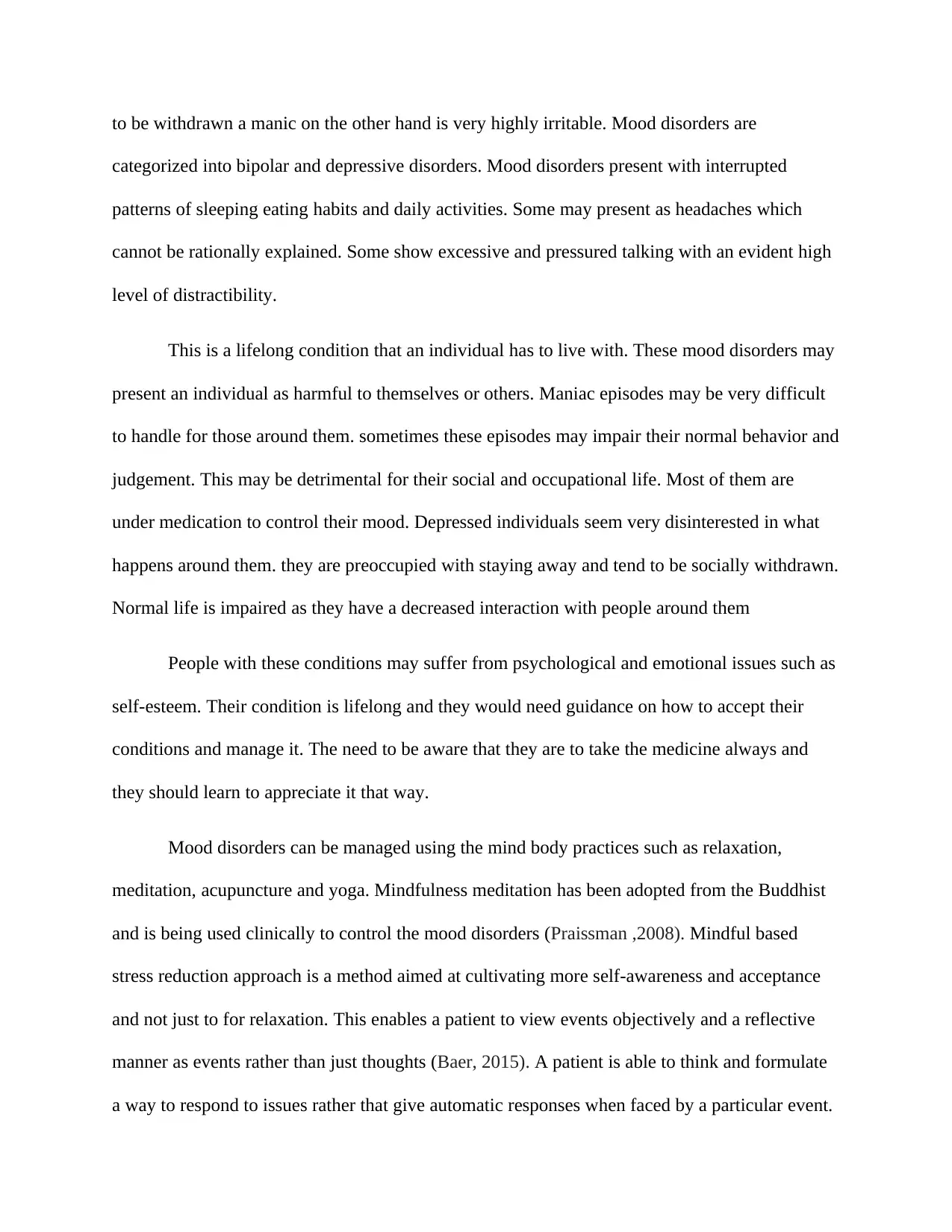
to be withdrawn a manic on the other hand is very highly irritable. Mood disorders are
categorized into bipolar and depressive disorders. Mood disorders present with interrupted
patterns of sleeping eating habits and daily activities. Some may present as headaches which
cannot be rationally explained. Some show excessive and pressured talking with an evident high
level of distractibility.
This is a lifelong condition that an individual has to live with. These mood disorders may
present an individual as harmful to themselves or others. Maniac episodes may be very difficult
to handle for those around them. sometimes these episodes may impair their normal behavior and
judgement. This may be detrimental for their social and occupational life. Most of them are
under medication to control their mood. Depressed individuals seem very disinterested in what
happens around them. they are preoccupied with staying away and tend to be socially withdrawn.
Normal life is impaired as they have a decreased interaction with people around them
People with these conditions may suffer from psychological and emotional issues such as
self-esteem. Their condition is lifelong and they would need guidance on how to accept their
conditions and manage it. The need to be aware that they are to take the medicine always and
they should learn to appreciate it that way.
Mood disorders can be managed using the mind body practices such as relaxation,
meditation, acupuncture and yoga. Mindfulness meditation has been adopted from the Buddhist
and is being used clinically to control the mood disorders (Praissman ,2008). Mindful based
stress reduction approach is a method aimed at cultivating more self-awareness and acceptance
and not just to for relaxation. This enables a patient to view events objectively and a reflective
manner as events rather than just thoughts (Baer, 2015). A patient is able to think and formulate
a way to respond to issues rather that give automatic responses when faced by a particular event.
categorized into bipolar and depressive disorders. Mood disorders present with interrupted
patterns of sleeping eating habits and daily activities. Some may present as headaches which
cannot be rationally explained. Some show excessive and pressured talking with an evident high
level of distractibility.
This is a lifelong condition that an individual has to live with. These mood disorders may
present an individual as harmful to themselves or others. Maniac episodes may be very difficult
to handle for those around them. sometimes these episodes may impair their normal behavior and
judgement. This may be detrimental for their social and occupational life. Most of them are
under medication to control their mood. Depressed individuals seem very disinterested in what
happens around them. they are preoccupied with staying away and tend to be socially withdrawn.
Normal life is impaired as they have a decreased interaction with people around them
People with these conditions may suffer from psychological and emotional issues such as
self-esteem. Their condition is lifelong and they would need guidance on how to accept their
conditions and manage it. The need to be aware that they are to take the medicine always and
they should learn to appreciate it that way.
Mood disorders can be managed using the mind body practices such as relaxation,
meditation, acupuncture and yoga. Mindfulness meditation has been adopted from the Buddhist
and is being used clinically to control the mood disorders (Praissman ,2008). Mindful based
stress reduction approach is a method aimed at cultivating more self-awareness and acceptance
and not just to for relaxation. This enables a patient to view events objectively and a reflective
manner as events rather than just thoughts (Baer, 2015). A patient is able to think and formulate
a way to respond to issues rather that give automatic responses when faced by a particular event.
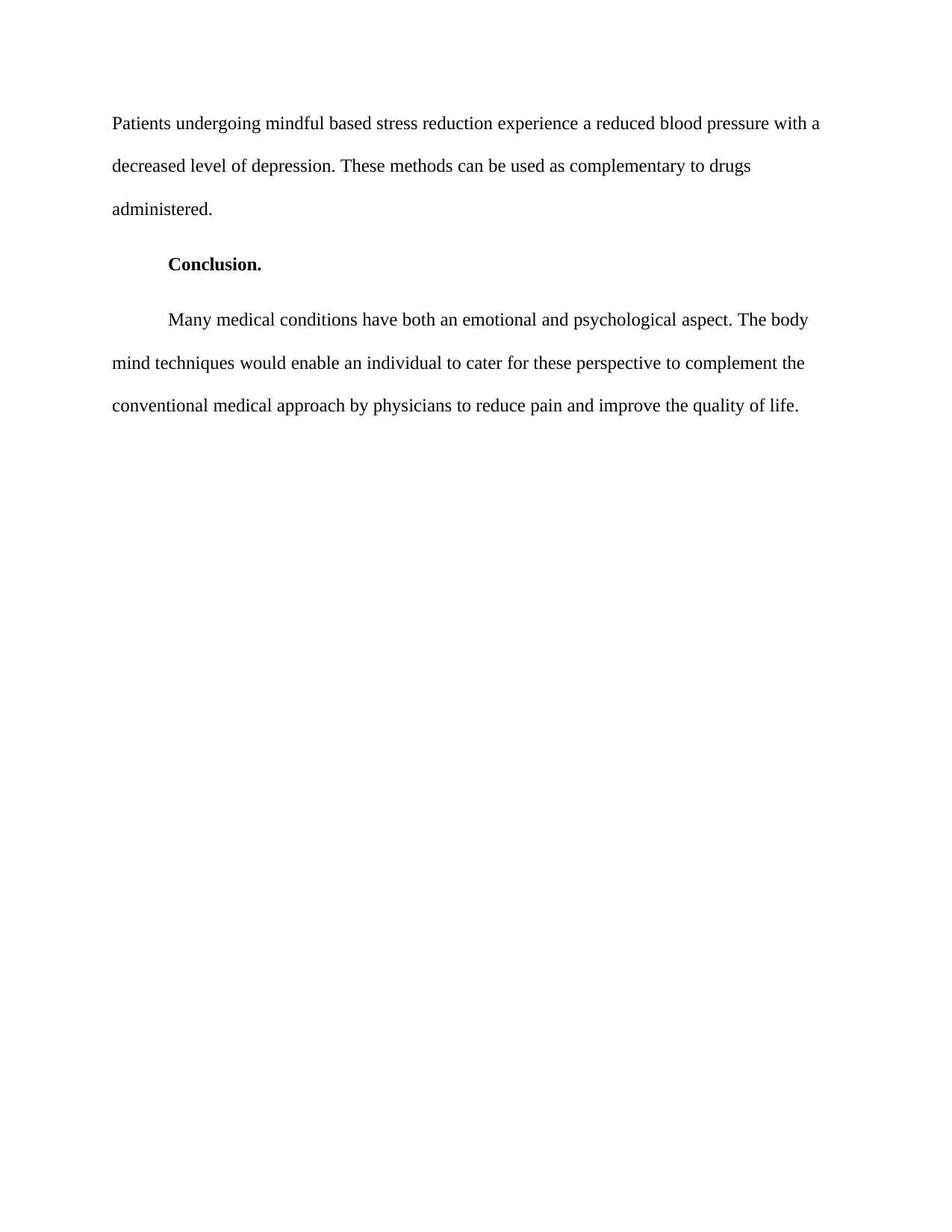
Patients undergoing mindful based stress reduction experience a reduced blood pressure with a
decreased level of depression. These methods can be used as complementary to drugs
administered.
Conclusion.
Many medical conditions have both an emotional and psychological aspect. The body
mind techniques would enable an individual to cater for these perspective to complement the
conventional medical approach by physicians to reduce pain and improve the quality of life.
decreased level of depression. These methods can be used as complementary to drugs
administered.
Conclusion.
Many medical conditions have both an emotional and psychological aspect. The body
mind techniques would enable an individual to cater for these perspective to complement the
conventional medical approach by physicians to reduce pain and improve the quality of life.
⊘ This is a preview!⊘
Do you want full access?
Subscribe today to unlock all pages.

Trusted by 1+ million students worldwide
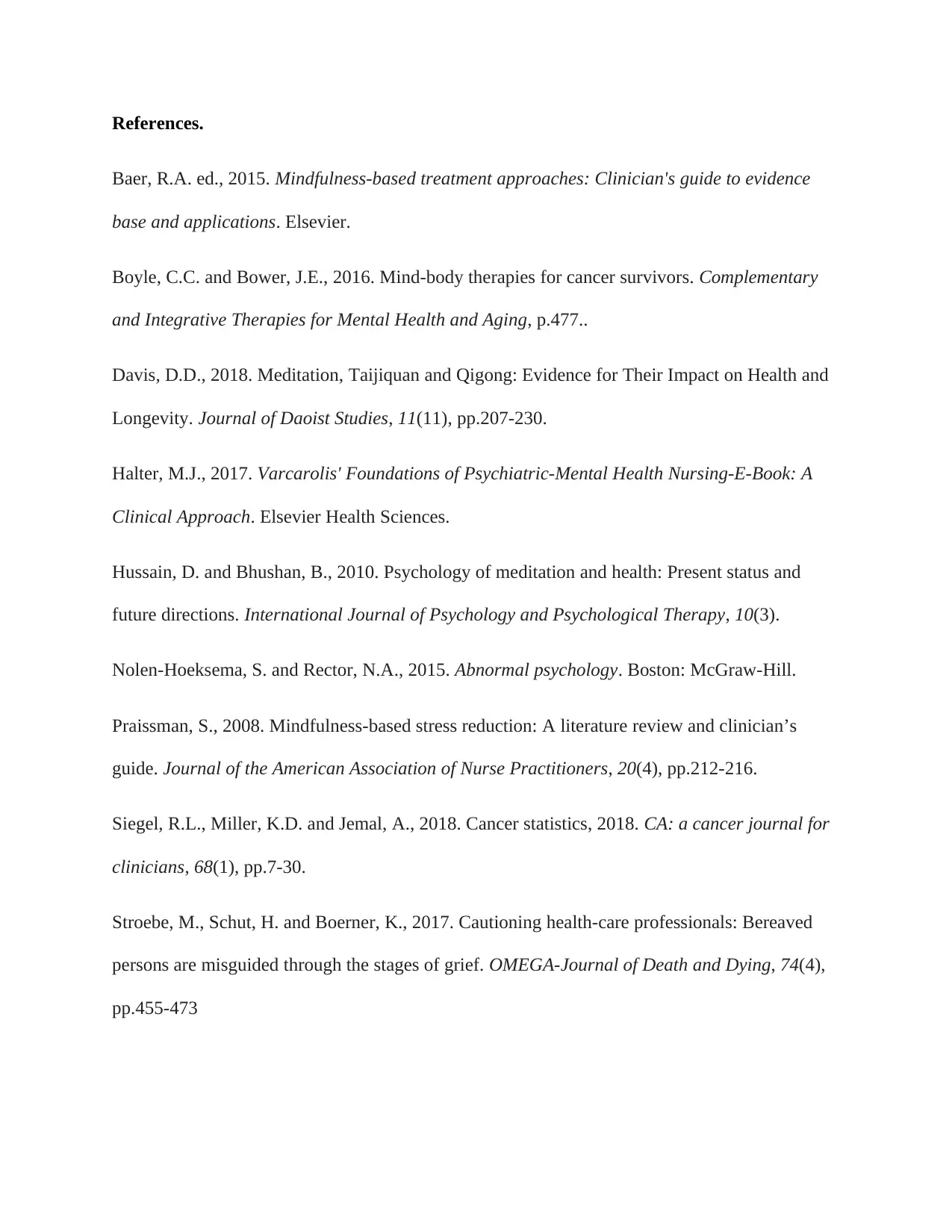
References.
Baer, R.A. ed., 2015. Mindfulness-based treatment approaches: Clinician's guide to evidence
base and applications. Elsevier.
Boyle, C.C. and Bower, J.E., 2016. Mind-body therapies for cancer survivors. Complementary
and Integrative Therapies for Mental Health and Aging, p.477..
Davis, D.D., 2018. Meditation, Taijiquan and Qigong: Evidence for Their Impact on Health and
Longevity. Journal of Daoist Studies, 11(11), pp.207-230.
Halter, M.J., 2017. Varcarolis' Foundations of Psychiatric-Mental Health Nursing-E-Book: A
Clinical Approach. Elsevier Health Sciences.
Hussain, D. and Bhushan, B., 2010. Psychology of meditation and health: Present status and
future directions. International Journal of Psychology and Psychological Therapy, 10(3).
Nolen-Hoeksema, S. and Rector, N.A., 2015. Abnormal psychology. Boston: McGraw-Hill.
Praissman, S., 2008. Mindfulness‐based stress reduction: A literature review and clinician’s
guide. Journal of the American Association of Nurse Practitioners, 20(4), pp.212-216.
Siegel, R.L., Miller, K.D. and Jemal, A., 2018. Cancer statistics, 2018. CA: a cancer journal for
clinicians, 68(1), pp.7-30.
Stroebe, M., Schut, H. and Boerner, K., 2017. Cautioning health-care professionals: Bereaved
persons are misguided through the stages of grief. OMEGA-Journal of Death and Dying, 74(4),
pp.455-473
Baer, R.A. ed., 2015. Mindfulness-based treatment approaches: Clinician's guide to evidence
base and applications. Elsevier.
Boyle, C.C. and Bower, J.E., 2016. Mind-body therapies for cancer survivors. Complementary
and Integrative Therapies for Mental Health and Aging, p.477..
Davis, D.D., 2018. Meditation, Taijiquan and Qigong: Evidence for Their Impact on Health and
Longevity. Journal of Daoist Studies, 11(11), pp.207-230.
Halter, M.J., 2017. Varcarolis' Foundations of Psychiatric-Mental Health Nursing-E-Book: A
Clinical Approach. Elsevier Health Sciences.
Hussain, D. and Bhushan, B., 2010. Psychology of meditation and health: Present status and
future directions. International Journal of Psychology and Psychological Therapy, 10(3).
Nolen-Hoeksema, S. and Rector, N.A., 2015. Abnormal psychology. Boston: McGraw-Hill.
Praissman, S., 2008. Mindfulness‐based stress reduction: A literature review and clinician’s
guide. Journal of the American Association of Nurse Practitioners, 20(4), pp.212-216.
Siegel, R.L., Miller, K.D. and Jemal, A., 2018. Cancer statistics, 2018. CA: a cancer journal for
clinicians, 68(1), pp.7-30.
Stroebe, M., Schut, H. and Boerner, K., 2017. Cautioning health-care professionals: Bereaved
persons are misguided through the stages of grief. OMEGA-Journal of Death and Dying, 74(4),
pp.455-473
Paraphrase This Document
Need a fresh take? Get an instant paraphrase of this document with our AI Paraphraser
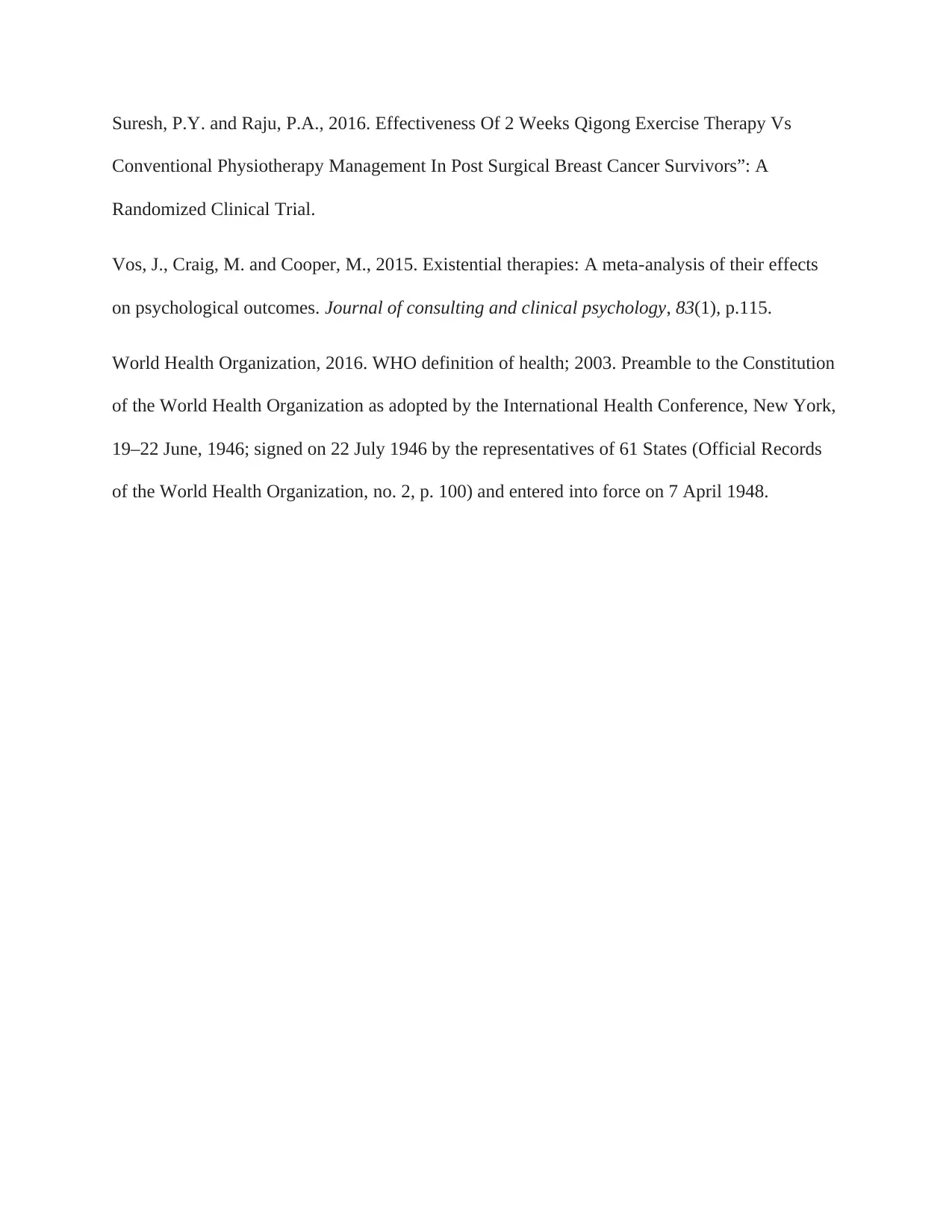
Suresh, P.Y. and Raju, P.A., 2016. Effectiveness Of 2 Weeks Qigong Exercise Therapy Vs
Conventional Physiotherapy Management In Post Surgical Breast Cancer Survivors”: A
Randomized Clinical Trial.
Vos, J., Craig, M. and Cooper, M., 2015. Existential therapies: A meta-analysis of their effects
on psychological outcomes. Journal of consulting and clinical psychology, 83(1), p.115.
World Health Organization, 2016. WHO definition of health; 2003. Preamble to the Constitution
of the World Health Organization as adopted by the International Health Conference, New York,
19–22 June, 1946; signed on 22 July 1946 by the representatives of 61 States (Official Records
of the World Health Organization, no. 2, p. 100) and entered into force on 7 April 1948.
Conventional Physiotherapy Management In Post Surgical Breast Cancer Survivors”: A
Randomized Clinical Trial.
Vos, J., Craig, M. and Cooper, M., 2015. Existential therapies: A meta-analysis of their effects
on psychological outcomes. Journal of consulting and clinical psychology, 83(1), p.115.
World Health Organization, 2016. WHO definition of health; 2003. Preamble to the Constitution
of the World Health Organization as adopted by the International Health Conference, New York,
19–22 June, 1946; signed on 22 July 1946 by the representatives of 61 States (Official Records
of the World Health Organization, no. 2, p. 100) and entered into force on 7 April 1948.
1 out of 8
Related Documents
Your All-in-One AI-Powered Toolkit for Academic Success.
+13062052269
info@desklib.com
Available 24*7 on WhatsApp / Email
![[object Object]](/_next/static/media/star-bottom.7253800d.svg)
Unlock your academic potential
Copyright © 2020–2026 A2Z Services. All Rights Reserved. Developed and managed by ZUCOL.





